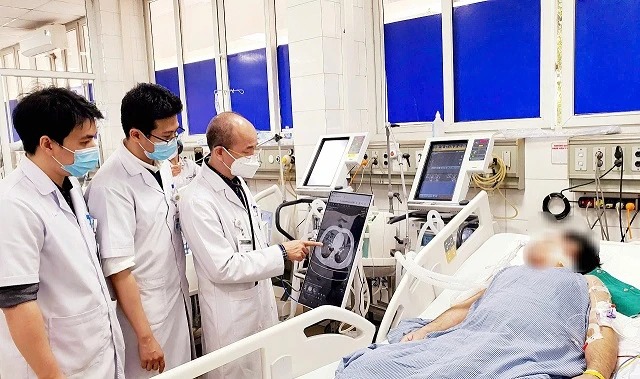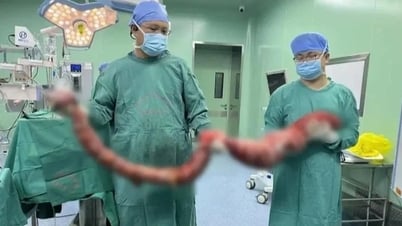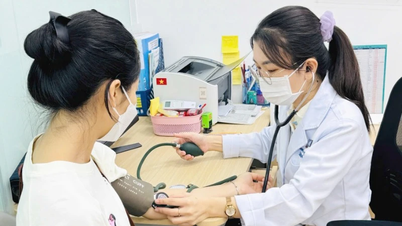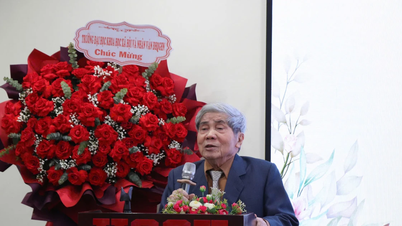First adult dies of measles in 2025 in Vietnam
The patient had a history of chronic diseases including chronic obstructive pulmonary disease (COPD), type 2 diabetes and hypertension. Three days before being admitted to the hospital, Mr. H. developed symptoms of dry cough, fever, shortness of breath and a red rash that spread from his face to his body.
Measles patients treated at Bach Mai Hospital. |
After 4 days of inpatient treatment at Bach Mai Hospital, the patient's difficulty breathing became increasingly severe, forcing him to be transferred to the Intensive Care Unit, Institute of Tropical Medicine with a diagnosis of measles complicated by pneumonia. The patient was treated with respiratory support using high-flow oxygen therapy (HFNC).
However, Mr. H.'s condition continued to worsen, requiring intubation and mechanical ventilation. After two days of intensive treatment, the patient fell into septic shock and stopped circulating. Doctors performed emergency resuscitation and restored the patient's pulse. During treatment, Mr. H. was diagnosed with a multidrug-resistant bacterial infection.
Despite receiving dialysis and extracorporeal membrane oxygenation (ECMO), the patient did not respond to treatment and died. This is the first death from measles in an adult recorded in Vietnam in 2025.
According to Associate Professor, Dr. Do Duy Cuong, currently, hospitalized measles cases tend to be more severe than in previous years. The average age of hospitalized measles patients ranges from 30 to 65 years old, with some 70-year-olds requiring ventilators due to severe complications.
“Measles cannot be taken lightly, even in adults. When infected, the risk of serious complications remains very high, especially in people with underlying diseases or immunodeficiency,” he warned.
Associate Professor, Dr. Cuong added that up to 75% of patients do not remember whether they have been vaccinated against measles or not. Since the end of 2024, Bach Mai Institute of Tropical Medicine has received and treated hundreds of measles cases, many of which have progressed severely, with complications such as pneumonia, respiratory failure, and increased liver enzymes; some cases require invasive ventilation, even ECMO.
Experts warn that measles not only affects children but also occurs in adults - especially those with underlying diseases or weakened immune systems. For this group of people, a booster shot is needed if they have not been vaccinated or do not remember their vaccination history.
In Vietnam, measles vaccine is indicated for children from 9 months of age with a full regimen of 2 injections. Through surveys and research, the Vietnamese Ministry of Health decided to choose the 9-month age mark because this is the time when children no longer have passive antibodies protecting them from their mothers, and vaccination will result in a high immune response.
In epidemic and high-risk areas, children can be vaccinated from 6 months to under 9 months of age. This is the measles 0 shot to prevent the disease early, after which children continue to receive the first shot at 9 months or 12 months of age.
For children under 6 months of age, medical experts recommend preventing the disease by vaccinating family members who are in frequent contact with the child.
Adults can unintentionally become an intermediate source of infection for children. Self-prevention will create an invisible "shield" to protect children until they are old enough to be vaccinated. At the same time, this also creates cross-immunity with other vulnerable groups such as pregnant women, the elderly, people with underlying medical conditions, and people with immunodeficiency.
The Ministry of Health affirmed that it will continue to closely monitor the progress of the vaccination campaign, while ensuring that vaccination activities take place safely, effectively and economically.
This is one of the important measures to protect the health of children and the community, preventing the spread of measles in the context of a possible outbreak.
With the continuous efforts of the Ministry of Health, relevant agencies and localities, the measles vaccination campaign in 2025 will make an important contribution to protecting public health, creating a solid foundation for controlling measles and other infectious diseases in the future.
Doctor Bach Thi Chinh, Medical Director of VNVC Vaccination System, said that although the measles vaccine is highly effective, it is necessary to fully vaccinate according to regulations, because if only one dose of vaccine is injected, the disease prevention efficiency is only 85%, so 2 doses must be injected to bring optimal protection. Almost all people who have been fully vaccinated will not be at risk of measles or measles infection will have very mild symptoms.
ECMO saves life of critically ill patient with influenza A
108 Military Central Hospital has just saved the life of an elderly patient in critical condition due to influenza A using extracorporeal membrane oxygenation (ECMO - artificial heart-lung system).
The patient is a 71-year-old male residing in Bac Giang , diagnosed with severe influenza A, with complications of progressive acute respiratory failure. Before being hospitalized, the patient had symptoms of cough, fever, and muscle aches but self-treated at home without improvement.
After a period of ineffective treatment at the lower level, the patient was transferred to the Department of Internal Medicine and Anti-Poisoning, Intensive Care Center, 108 Central Military Hospital in a state of severe respiratory failure, requiring mechanical ventilation.
Test results confirmed that the patient was positive for influenza A virus. Diagnostic images showed diffuse lung damage, with the lungs almost completely losing the ability to exchange gases.
Given the patient’s worsening condition and his failure to respond to mechanical ventilation, doctors decided to use the ECMO system - one of the most modern resuscitation methods available today. This system acts as an “artificial lung”, temporarily replacing the gas exchange function of the lungs by pumping blood out of the body, enriching it with oxygen and removing CO₂, then returning it to the circulation.
After 4 days of using ECMO and active treatment, the patient's respiratory condition improved significantly, the ECMO system was removed, and the patient gradually recovered.
Dr. Pham Dang Hai, Head of the Department of Internal Medicine Resuscitation and Poison Control, warned that influenza A is a common respiratory disease in winter-spring and the changing seasons. Influenza A virus spreads rapidly through the respiratory tract, especially through droplets when a sick person coughs, sneezes or comes into contact with a surface contaminated with the virus.
He emphasized that high-risk groups such as the elderly, people with underlying diseases (cardiovascular, diabetes, obstructive pulmonary disease, etc.), pregnant women or people with immunodeficiency need to be especially vigilant. If influenza is not treated properly, the disease can cause serious complications such as disseminated pneumonia, bacterial superinfection, myocarditis, multiple organ failure and even death.
Health experts recommend that people, especially high-risk groups, should get vaccinated against the flu every year. Vaccination not only helps the body build immunity against the virus but also reduces the risk of serious complications if the disease occurs.
In addition, it is necessary to maintain good personal hygiene habits: wash hands regularly, wear a mask in crowded places, cover your mouth when coughing/sneezing and limit contact with people with flu symptoms.
26-year-old man had back pain for 2 years, discovered he had a disease that could cause disability
After two years of living with dull pain in the lumbar region, a 26-year-old man (hereinafter referred to as Mr. A.) came to MEDLATEC General Hospital for examination. The diagnosis showed that he had ankylosing spondylitis - a dangerous chronic arthritis that can lead to joint stiffness, spinal deformity and disability if not detected and treated promptly.
According to his medical history, Mr. A. said that he had frequent back pain that lasted for two years, the pain increased at night, improved with movement, was not accompanied by morning stiffness, had no history of trauma, and had never been treated with medication.
With typical symptoms of “inflammatory pain” lasting more than 3 months and the patient under 45 years old, doctors at MEDLATEC aimed to diagnose ankylosing spondylitis - a form of chronic arthritis related to autoimmune mechanisms.
The patient was assigned to perform paraclinical tests, including magnetic resonance imaging (MRI) of the spine and sacroiliac joints, blood tests to check for inflammation index, vitamin D and HLA-B27 antigen.
MRI results showed degeneration of lumbar discs, mild disc bulges in the L3/4, L4/5, L5/S1 vertebrae; edema of the L2/3, L3/4, L4/5 interspinous ligaments; bilateral sacroiliitis, more severe on the left side.
Blood tests showed elevated inflammatory markers (CRP and erythrocyte sedimentation rate), positive HLA-B27, and low blood vitamin D levels. Based on ASAS (Association for the Assessment of Ankylosing Spondylitis) criteria, the doctor diagnosed Mr. A. with active ankylosing spondylitis and vitamin D deficiency. The patient was prescribed pain relievers, muscle relaxants, and vitamin D supplements according to the treatment regimen of the musculoskeletal specialist.
According to MSc.BSCKII Trinh Thi Nga, Head of the Department of Musculoskeletal, Medlatec Healthcare System, ankylosing spondylitis (AS) is a chronic inflammatory arthritis that mainly affects the spine and sacroiliac joints, but can also affect peripheral joints such as the shoulders, hips, knees, ankles - wrists, or tendon attachments such as the Achilles tendon, tendon attachments in the hip and elbow.
The disease is common in men between the ages of 15 and 40, with a rate of 3-4 times higher than that of women. The cause of the disease is still unclear, but is closely related to genetic factors, in which over 90% of people with the disease carry the HLA-B27 antigen. HLA-B27 is considered a sensitive genetic factor, which can combine with infectious factors (gastrointestinal and urinary tract bacteria), poor living conditions, trauma... causing immune system disorders and disease onset.
Typical symptoms of ankylosing spondylitis are persistent low back pain, increasing at night, decreasing with movement, accompanied by morning stiffness or after prolonged immobilization.
Patients may have pain in peripheral joints (shoulders, hips, knees, wrists, ankles), pain in the buttocks due to sacroiliitis, enthesitis or Achilles tendonitis, and even symptoms such as uveitis (pain, blurred vision), gastrointestinal disorders (enteritis, bloody stools), lung and cardiovascular damage, anemia, and vitamin D deficiency.
If not detected early and treated properly, ankylosing spondylitis can lead to many dangerous complications such as joint fusion, spinal deformity, aortic damage, pulmonary fibrosis, chronic pain, movement disorders and psychological disorders. A rare but serious complication is cauda equina syndrome - causing permanent paralysis of the lower limbs and loss of bladder and bowel control.
There is currently no cure for ankylosing spondylitis. However, if detected early and treated properly, patients can effectively control symptoms, maintain mobility, and limit complications. Treatment regimens often include anti-inflammatory drugs, biologic drugs (TNF-alpha, IL-17 inhibitors), physical therapy, vitamin D supplementation, and regular exercise.
Experts recommend that young people should not be subjective with prolonged lower back pain, especially pain at night or improved with movement. If suspicious signs appear, they should go to medical facilities with musculoskeletal specialists for timely examination and treatment.




![[Photo] The Government Standing Committee works with ministries and branches on the real estate market situation.](https://vphoto.vietnam.vn/thumb/1200x675/vietnam/resource/IMAGE/2025/5/24/e9b5bc2313d14c9499b8c9b83226adba)



![[Photo] Ho Chi Minh City holds funeral for former President Tran Duc Luong](https://vphoto.vietnam.vn/thumb/1200x675/vietnam/resource/IMAGE/2025/5/24/9c1858ebd3d04170b6cef2e6bcb2019e)




















![[Photo] Party and State leaders visit former President Tran Duc Luong](https://vphoto.vietnam.vn/thumb/1200x675/vietnam/resource/IMAGE/2025/5/24/960db9b19102400e8df68d5a6caadcf6)





































































Comment (0)